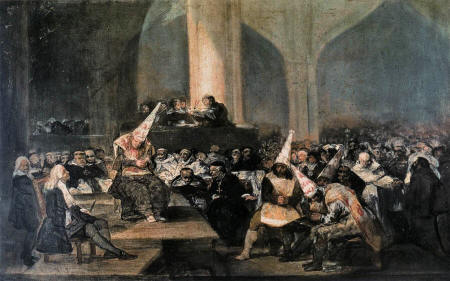|
|
|
by
Andy Dilks
as illustrated by Francisco de Goya.
It's a loaded question which, needless to say, provoked a lively debate on the nature of religion as a force for oppression and negativity in the world today.
As one person expressed it:
It's not hard to see why so many people think this way - religious
wars and persecution have, over the centuries, killed untold
millions; the tenets of Holy scriptures used as a justification for
a litany of crimes against humanity, from the Crusades in the Near
East and the conquest of the New World and subsequent genocide of
the indigenous population, to
the horrific Inquisition and the
frequent slaughter of heathens "in the name of our lord Jesus
Christ".
Judaism, too, is
often deliberately equated with Zionism, in order to absolve the
state of Israel any culpability for its crimes against humanity
committed against the Palestinian people and other Arab neighbors.
It is an irony which is perhaps best summed
up by the foundation of the first "atheist church" in London earlier
this year; while calls to stamp out religion altogether resound with
Evangelical zeal.
The ambiguous nature of these texts - the allegories and
parables loaded with hidden meaning and symbolism - are, by their
nature, open to misinterpretation and abuse.
Compare
the Christian Gnostics or Neoplatonists with the early Roman
Christians where Greco-Roman pantheism still played a role, to the
Catholic church and the huge schisms of the Protestant Reformation,
and it is clear how impossible it is to define Christianity as any
one thing. There are probably more Christian denominations scattered
around the globe today than at any other point in history, with an
influence as equally varied.
Loans made with excessive and abusive interest rates plunge millions into debt, an immoral practice known as usury.
All the main religions, from Judaism and Christianity to Islam and Buddhism, have condemned this practice, with numerous references found throughout the Hebrew Bible, New Testament, Qur'an and even the ancient Indian Vedas.
Few
would disagree that the world would be a significantly better place
without the unscrupulous practices of modern day moneylenders.
a woodcut by Lucas Cranach the Elder in
'Passionary of Christ
and Antichrist'
Heavily influenced by the Gnostics, Blake has been described by some
as a visionary anarchist.
Russian writer Leo Tolstoy's views on anarchism were pacified by his devotion to Christianity.
In his 1900 essay "On Anarchy", Tolstoy wrote:
William Blake is one who recognized how the profound spiritual truths of religious texts were sunk into obscurity by the institution of the Church. He condemned the sophistry of theological thought, which endorsed individual repression where "sin" bound men's desires, while at the same time excusing acts of evil and injustice.
These criticisms still stand today, not least in the manner in which religious institutions often deny that any kind of spiritual understanding can come from within.
The Gnostics and many others were persecuted by the Roman Catholic Church after the Council of Nicea in 325, and the Church ended up becoming self-proclaimed arbiters of "spiritual enlightenment" whereby the average person could only encounter the divine through the medium of the priest.
The pulpit often stands as an emblem for the spreading
of dogmatic ignorance in the form of false wisdoms, subverting
Christ's teachings with skillful sophistry to protect its own wealth
and authority.
Isaac Newton, a founding father of the modern scientific method, was profoundly influenced by the occult and was described by John Maynard Keynes in 1942 as,
As well as being a practicing alchemist, he believed he was specially chosen by God for the task of understanding Biblical scripture. These characteristics certainly cast a new light on a man who is often thought of as the archetypal materialist scientist.
Newton ushered in an era dominated by the
mechanistic view of the universe which went on to exclude the
alchemical and religious views that Newton himself considered of
vital importance.
William Blake's "Newton"
Dogmatism which inhibits these paradigm shifts can be scientific as well as religious, as has become increasingly apparent in the recent developments into the study of consciousness.
Graham Hancock's TEDx talk The War on Consciousness, in which he discussed the role of ancient and sacred visionary plants and shamanism in our understanding of the mind, is a prime example of the negative impact of such scientific dogmatism.
After failing to qualify these accusations with any supporting evidence and facing an intense backlash from the public, TED was forced to backtrack and retract their initial statement.
The video
was uploaded in an obscure location on their blog, with TED
maintaining that Hancock's views were well outside "orthodox
scientific thinking".
TED demonstrated that they represent precisely the kind of materialist scientific thinking which Hancock explicitly stated in his talk was incapable of dealing with the difficult questions of consciousness.
A paradigm which precludes even the possibility of the experiential
validity of shamanic altered states of consciousness and refuses to
question the position that consciousness resides entirely in the
brain inevitably greets such ideas with automatic ridicule and
rejection.
In taking the
position of the rigid skeptic in dealing with Hancock's approach to
consciousness, TED, whose slogan is "Ideas Worth Sharing",
demonstrated that conformity to established doctrines takes
precedence over radical new ideas truly worth sharing.
But we should also recognize the positive aspects of different beliefs and integrate them in order to gain a broader understanding with the potential to surpass "conventional wisdom" (which, as history shows us, more often than not turns out to be untrue).
As Einstein said (and Newton appeared to understand),
|



